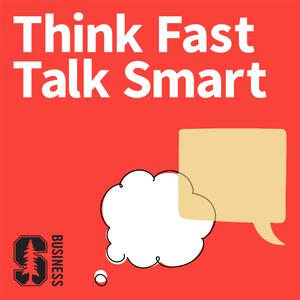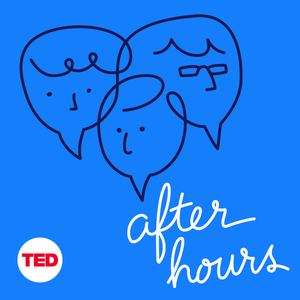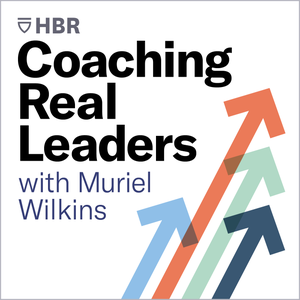
Think Fast, Talk Smart: Communication Techniques
Stanford GSB
Join Matt Abrahams, a lecturer of Strategic Communication at Stanford Graduate School of Business, as he sits down with experts in the field to discuss real-world challenges. How do I send my message clearly when put on the spot? How do I write emails to get my point across? How can I easily convey complex information? How do I manage my reputation? Whether you’re giving a toast or presenting in a meeting, communication is critical to success in business and in life.Think Fast, Talk Smart provides the tools, techniques, and best practices to help you communicate more effectively.
- 36 minutes 1 second152. Fix Your Communication: Why It’s About Connection Over Perfection
“Anything is fixable,” say Frances Frei and Anne Morriss. As cohosts of the Fixable podcast, they’re typically the ones doing the fixing, but on this special episode, they turn to Matt Abrahams for tips on what to do when communication breaks down.
Both Frei and her wife Morriss are public speakers; the former, a professor at Harvard Business School, the latter, a CEO and best-selling author. As they discuss with Matt Abrahams, perfectionism and self-doubt can often creep in, both during preparation before speaking and after the fact. According to Matt, effective communication is about “connection, not perfection.” Instead of putting pressure on ourselves to “get it right,” Matt encourages us to shift our focus from ourselves to those we’re speaking to. “Whenever you're communicating, you're in service of the audience you're communicating to,” he says. “It's not about you, it's about them and what you can do for them.”
In this podcast episode, Frei, Morriss, and Matt explore frameworks and strategies for speaking more spontaneously, building confidence, managing anxiety, and course-correcting when communication goes awry.
Episode Reference Links:
- Fixable Podcast: Website
- Anne Morriss & Frances Frei: Website
- Anne Morriss: LinkedIn
- Frances Frei: HBS Profile
Connect:
- Email Questions & Feedback >>> [email protected]
- Episode Transcripts >>> Think Fast Talk Smart Website
- Newsletter Signup + English Language Learning >>> FasterSmarter.io
- Think Fast Talk Smart >>> LinkedIn Page, Instagram, YouTube
- Matt Abrahams >>> LinkedIn
- Stanford GSB >>> LinkedIn & Twitter
Chapters:
(00:00:00) Introduction
Matt Abrahams introduces the episode, a collaboration with the Fixable podcast hosted by Frances Frei and Anne Morriss.
(00:04:58) Mission of Spontaneous Speaking
Matt discusses his focus on helping people communicate more effectively in unplanned situations.
(00:07:10) Audience Centered Communication
The importance of focusing on the audience to reduce anxiety and improve communication.
(00:09:51) Connection Over Perfection
Prioritizing connection over perfection in communication.
(00:11:00) Benefits of Effective Communication
The benefits of improving spontaneous speaking skills.
(00:12:17) Building a Communication Infrastructure
An outline of helping organizations create supportive communication environments.
(00:13:33) Six Steps to Better Communication
A six-step process to improve spontaneous communication, covering mindset and messaging.
(00:16:55) Managing Communication Anxiety
Strategies for managing anxiety in high-stakes communication situations.
(00:21:00) Handling Blanking Out
How to handle and recover from blanking out during a speech or presentation.
(00:25:21) Real-Life Experience
A recent experience of underestimating time during a keynote and how the situation was managed.
(00:27:44) The Value of Preparation
The importance of preparation in both spontaneous and planned communication.
(00:28:43) AMP and Building Confidence
Three immediate strategies for reducing anxiety right before speaking.
(00:31:53) Conclusion
See Privacy Policy at https://art19.com/privacy and California Privacy Notice at https://art19.com/privacy#do-not-sell-my-info.
23 July 2024, 1:00 pm - 26 minutes 17 seconds151. Get Hired: How the Right Communication Can Advance Your Career
Whether winning over a hiring manager or winning new business, career success often hinges on how we communicate. That’s why Andrew Seaman is on a mission to help people find the words that work — to get work.
Seaman is the senior managing editor for jobs and career development at LinkedIn, and as the creator and host of the Get Hired podcast and newsletter, he helps millions hone communication skills to land the jobs they want. According to him, getting opportunities isn’t just about experience or connections, but how we frame and present our personal and professional narratives. With a standard resume, he says, “You're making them connect the dots. And people are not good at that.” Instead, he recommends crafting a story that explains where you’ve been, where you are, and where you hope to go. “Connect the dots for them,” he says, “so they're not viewing you as a person who has bounced around. They're thinking, this person has had a cohesive career.”
In this episode of Think Fast, Talk Smart, Seaman and host Matt Abrahams explore tools for navigating the interview process, networking on and offline, and communication strategies to get hired.
Episode Reference Links:
- Andrew Seaman: Website
- Andrew Seaman: LinkedIn
- Andrew’s Podcast: Get Hired
- Ep.118 Maximizing Your Brand: Communicating Who You Are to Help Get What You Want Website / YouTube
- Ep.147 Disrupt Yourself: How to Innovate Who You Are and Become Who You Can Be YouTube
- Ep.62 Best Of: Summer Learning Series, How Humor Can Be a Secret Weapon in Communication Website / YouTube
Connect:
- Email Questions & Feedback >>> [email protected]
- Episode Transcripts >>> Think Fast Talk Smart Website
- Newsletter Signup + English Language Learning >>> FasterSmarter.io
- Think Fast Talk Smart >>> LinkedIn Page, Instagram, YouTube
- Matt Abrahams >>> LinkedIn
- Stanford GSB >>> LinkedIn & Twitter
Chapters:
(00:00:00) Introduction
Host Matt Abrahams introduces guest Andrew Seaman, Senior Managing Editor for Jobs and Career Development at LinkedIn.
(00:00:57) Importance of Online Presence
The significance of maintaining an online presence and tips on optimizing LinkedIn profiles.
(00:01:52) Posting on LinkedIn
The frequency and type of posts on LinkedIn, balancing professional and personal content.
(00:03:41) Commenting vs. Posting
Advice on adding value through comments and engaging with posts.
(00:05:12) Interview Presence
The importance of presence in interviews, sharing examples of making good and bad impressions.
(00:06:59) Recovering from Bad Impressions
The challenges and possibilities of recovering from a poor first impression in an interview setting.
(00:07:48) Interviewing from the Interviewer's Perspective
Tips for hiring managers on how to conduct effective interviews and evaluate candidates.
(00:10:25) Challenging Interview Questions
The appropriateness and benefits of challenging candidates during interviews to assess their fit and preparedness.
(00:11:44) Best Practices for Interviewees
Strategies for interviewees to prepare and effectively answer questions, using the ADD method.
(00:13:58) Handling Spontaneity in Interviews
Preparing for interviews when time is limited and the importance of flexibility and adaptability.
(00:17:17) Following Up After Interviews
Best practices for following up after an interview to leave a positive impression.
(00:19:43) Broader Career Advice
Leveraging online communities and tools for career growth, emphasizing networking.
(00:22:14) The Final Three Questions
Andrew shares his favorite response to an interview question, a communicator he admires, and three ingredients for successful communication.
(00:25:31) Conclusion
See Privacy Policy at https://art19.com/privacy and California Privacy Notice at https://art19.com/privacy#do-not-sell-my-info.
16 July 2024, 1:00 pm - 21 minutes 9 seconds150. Communication Tips from the Classroom and Around the World
Sometimes, what’s communicated to us can have a big impact on how we communicate to others. This episode explores some of the best communication advice — from experts and Think Fast, Talk Smart listeners around the world.
As teachers of Strategic Communication, lecturers Shawon Jackson and Matt Abrahams have plenty of advice on how to be a better communicator. But in this 150th episode of Think Fast, Talk Smart, the two don’t just discuss the communication strategies they share with students in their class, they also feature communication advice from listeners of the podcast.
Covering topics like knowing your audience, using transitions to tie together different ideas, and embracing the power of silence, Jackson and Abrahams unpack good advice for good communication in this celebratory episode of Think Fast, Talk Smart.
Episode Reference Links:
- Stanford Profile: Shawon Jackson
- Shawon’s Educational Program: Vocal Justice
Connect:
- Email Questions & Feedback >>> [email protected]
- Episode Transcripts >>> Think Fast Talk Smart Website
- Newsletter Signup + English Language Learning >>> FasterSmarter.io
- Think Fast Talk Smart >>> LinkedIn Page, Instagram, YouTube
- Matt Abrahams >>> LinkedIn
- Stanford GSB >>> LinkedIn & Twitter
Chapters:
(00:00:00) Introduction
Host Matt Abrahams joins guest Shawon Jackson, a lecturer at Stanford GSB, for the 150th episode of Think Fast, Talk Smart.
(00:01:25) The Role of Effective Transitions
The importance of transitions in communication, and an outline of four key types.
(00:04:11) Techniques for Using Slides
Advice on creating effective presentation slides, emphasizing story first and less is more.
(00:07:23) Listener Advice: Knowing Your Audience
Listeners Kevin Weinstein and Kesinee Angkustsiri Yip share the importance of knowing your audience.
(00:08:34) Techniques for Understanding Your Audience
Practical techniques for understanding your audience
(00:10:49) Listener Advice: The Power of Silence
Listener Ashita Tenki shares advice on the power of silence in communication.
(00:11:22) Practicing Silence in Communication
The benefits of holding silence and techniques for making it more comfortable.
(00:12:45) Addressing Communication Pet Peeves
Shawon and Matt share communication pet peeves, and discuss best practices.
(00:16:07) Listener Advice on the Importance of Listening
Listener Digant Dave highlights listening as a critical communication tool.
(00:17:07) Strategies for Effective Listening [00:17:54 - 00:18:19]
The importance of listening for both content and emotional context in communication.
(00:19:39) Conclusion
See Privacy Policy at https://art19.com/privacy and California Privacy Notice at https://art19.com/privacy#do-not-sell-my-info.
9 July 2024, 1:00 pm - 26 minutes 45 seconds149. Best of: How to Take Risks in Your Communication, Relationships, and Career
“What people regret over time are things they didn’t do. They didn’t take that trip, they didn’t ask that person out on a date. They didn’t start that business,” says former political speechwriter and author Dan Pink. “I think it’s because we are slightly over-indexed on risk. We overstate the risk in many circumstances.”
In this episode of Think Fast, Talk Smart, strategic communications lecturer Matt Abrahams sits down with Pink to hear how we can take more risks and how leaders can inspire others by focusing on the why instead of the how. “There’s almost incontrovertible evidence that a sense of purpose is the most cost-effective performance enhancer that organizations have,” Pink says.
Episode Reference Links:
- Dan Pink: Website
- Dan’s Books: Website
- Original Episode: Ep.92 No Regrets: How to Take Risks in Your Communication, Relationships, and Career Website / YouTube
- Ep.103 Simple Is a Superpower: How to Communicate Any Idea to Any Audience Website / YouTube
- Ep.80 Magic Words: Change What You Say to Inspire and Influence Others Website / YouTube
Connect:
- Email Questions & Feedback >>> [email protected]
- Episode Transcripts >>> Think Fast Talk Smart Website
- Newsletter Signup + English Language Learning >>> FasterSmarter.io
- Think Fast Talk Smart >>> LinkedIn Page, Instagram, YouTube
- Matt Abrahams >>> LinkedIn
- Stanford GSB >>> LinkedIn & Twitter
Chapters:
(00:00:00) Introduction
Host Matt Abrahams introduces guest Dan Pink, a NYT bestselling author and former political speechwriter.
(00:01:17) Lessons from Political Speechwriting
Insights from Dan’s experience as a political speechwriter.
(00:03:58) Speak Like a Human
The necessity of authentic communication and the power of speaking naturally and directly.
(00:07:57) The Role of Immediacy in Communication
How immediacy can enhance connection and engagement in communication.
(00:09:24) Problem Finding vs. Problem-Solving
The value of identifying hidden problems in persuasive communication and sales.
(00:11:21) Understanding and Harnessing Purpose
How purpose enhances motivation and performance in work and life.
(00:15:11) Communication, Risk, and Regret
The impact of perceived versus actual risk in communication and decision-making.
(00:20:16) Timing and Breaks for Enhanced Performance
Optimizing performance through strategic timing and the importance of taking breaks.
(00:22:41) The Final Three Question
Dan shares communication advice, a communicator he admires, and three ingredients for successful communication.
(00:25:39) Conclusion
See Privacy Policy at https://art19.com/privacy and California Privacy Notice at https://art19.com/privacy#do-not-sell-my-info.
2 July 2024, 1:00 pm - 27 minutes 24 seconds148. Conviction and Compassion: How to Have Hard Conversations
In our personal and professional lives, some conversations are harder than others. To navigate the difficulties of discussing what matters most, Professor Irv Grousbeck says we need the right balance of conviction and compassion.
At both Stanford Graduate School of Business and Stanford School of Medicine, Grousbeck teaches courses on managing difficult conversations. He equips students with skills to be direct while being respectful, to be strong while being warm, and to resist any urge to beat around the bush. "Directness, with respect, is essential,” he says. "So many of our students feel that if you're direct with someone, somehow that's harsh. The art of good conversation management, I think, does involve directness and respect at the same time."
In this episode of Think Fast, Talk Smart, Grousbeck and host Matt Abrahams explore practical tips and strategies for navigating difficult conversations, from the importance of listening and pausing, to the value of rehearsing your words in advance.
Episode Reference Links:
- Stanford Profile: H. Irving Grousbeck
- Irv’s Book: New Business Ventures and the Entrepreneur
- Center for Entrepreneurial Studies | Stanford Graduate School of Business
Connect:
- Email Questions & Feedback >>> [email protected]
- Episode Transcripts >>> Think Fast Talk Smart Website
- Newsletter Signup + English Language Learning >>> FasterSmarter.io
- Think Fast Talk Smart >>> LinkedIn Page, Instagram, YouTube
- Matt Abrahams >>> LinkedIn
- Stanford GSB >>> LinkedIn & Twitter
Chapters:
(00:00:00) Introduction
Host Matt Abrahams introduces guest Irv Grousbeck, lecturer at Stanford GSB, and co-founder and co-director of the GSB Center for Entrepreneurial Studies.
(00:01:04) Ingredients for Entrepreneurial Success
The importance of being an opportunity finder and getting comfortable with the domain you are in.
(00:02:38) Myths About Entrepreneurship
Dispelling common myths about entrepreneurs.
(00:03:30) Can Entrepreneurs Be Made?
The potential for anyone to become an entrepreneur through hard work and exposure.
(00:04:07) Challenges in Communication
The most difficult communication challenges students face and tips to handle these situations.
(00:06:19) Imposter Syndrome
Dealing with imposter syndrome and advice on how to handle and overcome it.
(00:07:38) Managing Difficult Conversations
Manage challenging communication by starting conversations effectively and using collaborative language.
(00:10:15) Role-Playing Scenario
A role-playing exercise to demonstrate how to handle a challenging conversation.
(00:17:37) The Value of Listening
The importance of listening in crucial conversations and advice on how to listen more effectively.
(00:18:58) Career Advice
Advice on career planning, emphasizing the importance of context and strategic thinking.
(00:21:57) The Final Three Questions
Irv shares what he has learned from his students, a communicator he admires, and the key ingredients for successful communication.
(00:26:02) Conclusion
See Privacy Policy at https://art19.com/privacy and California Privacy Notice at https://art19.com/privacy#do-not-sell-my-info.
25 June 2024, 1:00 pm - 24 minutes 3 seconds147. Disrupt Yourself: How to Innovate Who You Are and Become Who You Can Be
Innovation and disruption aren’t just for organizations. According to Whitney Johnson, we can find new possibilities for personal and professional growth — by disrupting ourselves.
As an executive coach, author, and podcaster, Johnson teaches people how to level up their lives and careers through the power of personal disruption. Her book, Disrupt Yourself: Putting the Power of Disruptive Innovation to Work, reveals how shaking things up enables us to break free of the constraints we might not even know we’re imposing on ourselves. “Personal disruption [is] a process of deliberate self-innovation; a decision to step back from who you are to slingshot into who you can be,” she explains.
In this Think Fast, Talk Smart episode with host Matt Abrahams, Johnson offers strategies for tailoring messages to different audiences, reveals the key ingredients for successful communication, and explains how disrupting yourself can open new doors and help you reach your full potential.
Episode Reference Links:
- Whitney Johnson: Website
- Whitney’s Books: Website
- Whitney’s Podcast: Disrupt Yourself Podcast
- Lindsay McMahon’s Podcast: All Ears English Podcast
- Clayton Christensen’s Book: The Innovator's Dilemma
- Ep.118 Maximizing You Personal Brand: Communicating Who You Are to Help Get What You Want YouTube / Website
- Ep.138 Speak Your Truth: Why Authenticity Leads to Better Communication YouTube / Website
Connect:
- Email Questions & Feedback >>> [email protected]
- Episode Transcripts >>> Think Fast Talk Smart Website
- Newsletter Signup + English Language Learning >>> FasterSmarter.io
- Think Fast Talk Smart >>> LinkedIn Page, Instagram, YouTube
- Matt Abrahams >>> LinkedIn
- Stanford GSB >>> LinkedIn & Twitter
Chapters:
(00:00:00) Introduction
Host Matt Abrahams introduces Whitney Johnson, keynote speaker and executive coach.
(00:01:25) The Concept of Disruption
The definition of disruption, and the benefits of personal disruption and self-innovation.
(00:02:48) Identifying and Leveraging Distinctive Strengths
How to identify distinctive strengths through observing frustrations, listening to compliments, and valuing inherent skills.
(00:06:11) The S Curve of Learning
The S curve model, its stages, and how it relates to personal and organizational growth.
(00:11:56) Tenacity and Tolerance in Personal Disruption
The importance of tenacity, and the ability to tolerate ambiguity and failure during the disruptive process.
(00:13:35) Encouraging Disruptive Ideas in Organizations
Strategies for leaders to foster a culture that encourages disruptive ideas and constructive dialogue within teams.
(00:17:00) The Final Three Questions
Whitney shares how she tailors her communication for varying audiences, a communicator she admires, and her recipe for successful communication.
(00:22:30) Conclusion
See Privacy Policy at https://art19.com/privacy and California Privacy Notice at https://art19.com/privacy#do-not-sell-my-info.
18 June 2024, 1:00 pm - 19 minutes 6 seconds146. Stress Resets: How to Change Your Internal Dialogue to Communicate Better
Stress can get in the way of our communication with others. To manage our stress, psychologist Jenny Taitz says, we first need to adjust the conversations that we have with ourselves.
Taitz is an assistant clinical professor in psychiatry at the University of California, Los Angeles, and the author of several books, including Stress Resets: How to Soothe Your Body and Mind in Minutes. According to her, much of the stress we experience is self-created through negative thought patterns and harsh self-criticism. “We're doing this to ourselves all the time,” she says. But as we become aware of these unhelpful mental loops, Taitz’ “resets” can help us disrupt them and reframe self-talk in more productive ways
In addition to changing our self-talk, Taitz offers tools for refreshing our communication with others. In this episode of Think Fast, Talk Smart, she and host Matt Abrahams explore her G.I.V.E. framework — how being gentle, interested, validating, and easy-mannered equips us for more positive conversations with ourselves and others
Episode Reference Links:
- Jenny Taitz: Website
- Jenny’s Book: Website
- Communicator Jenny admires: Sharon Salzberg
- Ep.69 Feeling Nervous? How Anxiety Can Fuel Better Communication: YouTube / Website
- Ep.122 How to Be More Confident and Calm in Your Communication: Managing the "ABC’s" of...: Youtube
Connect:
- Email Questions & Feedback >>> [email protected]
- Episode Transcripts >>> Think Fast Talk Smart Website
- Newsletter Signup + English Language Learning >>> FasterSmarter.io
- Think Fast Talk Smart >>> LinkedIn Page, Instagram, YouTube
- Matt Abrahams >>> LinkedIn
- Stanford GSB >>> LinkedIn & Twitter
Chapters:
(00:00:00) Introduction
Host Matt Abrahams introduces guest Jenny Taitz, a clinical psychologist and an assistant clinical professor in psychiatry at UCLA.
(00:00:51) Understanding the Stress Cycle
Explanation of the stress cycle, highlighting common mistakes in stress management.
(00:02:38) Practical Tips for Managing Stress
Advice on resetting the mind, body, and behavior to manage stress more effectively.
(00:05:50) Addressing Overthinking and Rumination
Techniques for reducing overthinking and rumination, and recognizing and redirecting unproductive thought patterns.
(00:08:45) Swapping "Why" for "How"
Benefits of changing one's internal dialogue from "why" to "how" questions, facilitating a more proactive and less stressful mindset.
(00:10:56) Communicating Empathy
Introduction to the GIVE acronym, a method to help improve empathetic communication.
(00:12:58) The Final Three Questions
Jenny shares her personal methods for managing stress, a communicator she admires, and three ingredients for successful communication.
(00:17:33) Conclusion
See Privacy Policy at https://art19.com/privacy and California Privacy Notice at https://art19.com/privacy#do-not-sell-my-info.
11 June 2024, 1:00 pm - 15 minutes 19 seconds145. Best of: The Art of Negotiation, How to Get More of What You Want
Whether we realize it or not, we negotiate everyday. But when we approach these situations as a win-or-lose battle, we’re already showing resistance, and setting ourselves up for difficulty. But what if you reframed the whole idea, to think of a negotiation not as a fight, but as a problem-solving exercise involving emotions?
In this episode of Think Fast, Talk Smart, Matt Abrahams speaks with Stanford GSB Professor Emeritus Margaret Neale about what she has learned in her decades of researching negotiation and the steps that lead to more collaborative problem-solving.
Listen as Neale shares tips on how to approach negotiations with intention, and what strategies can help us more easily communicate our wants and needs. She is the coauthor of Getting (More of) What You Want: How the Secrets of Economics and Psychology Can Help You Negotiate Anything, in Business and in Life.
Episode Reference Links:
- Stanford Profile: Margaret Ann Neale
- Maggie’s Book: Getting (More of) What You Want
- Original Episode: Ep.15 The Art of Negotiation: How to Get More of What You Want Website / YouTube
Connect:
- Email Questions & Feedback >>> [email protected]
- Episode Transcripts >>> Think Fast Talk Smart Website
- Newsletter Signup + English Language Learning >>> FasterSmarter.io
- Think Fast Talk Smart >>> LinkedIn Page, Instagram, YouTube
- Matt Abrahams >>> LinkedIn
- Stanford GSB >>> LinkedIn & Twitter
Chapters:
(00:00:00) Introduction
Host Matt Abrahams introduces guest Maggie Neale, the Adams Distinguished Professor of Management Emerita at Stanford GSB
(00:01:22) Definition of Negotiation
Negotiation as collaborative problem-solving, emphasizing mutual benefit over adversarial tactics
(00:04:28) Planning and Preparation
Strategies for preparing for negotiations, including understanding alternatives and setting a reservation price.
(00:08:41) Structuring Negotiation Messages
Structuring negotiation messages, including the concept of chunking multiple issues together.
(00:10:17) Role of Emotion in Negotiation
How different emotions influence thinking and the importance of managing emotions in negotiation.
(00:11:31) Best Communication Advice
Maggie shares her best communication advice, a communicator she admires, and ingredients for successful communication.
(00:14:34) Conclusion
Think Fast, Talk Smart is a podcast produced by Stanford Graduate School of Business and hosted by Matt Abrahams. Each episode provides concrete, easy-to-implement tools and techniques to help you hone and enhance your communication.
See Privacy Policy at https://art19.com/privacy and California Privacy Notice at https://art19.com/privacy#do-not-sell-my-info.
4 June 2024, 2:00 pm - 21 minutes 14 seconds144. Communicating Through Conflict: How to Get Along with Anyone
Many of us would rank getting along with colleagues as an important aspect of work, but, as Amy Gallo explains, relationships devoid of disagreement can actually be less productive.
“While our natural human instinct is to avoid conflict, I believe that conflicts are not only an inevitable part of interacting with other humans, but they're a necessary part.”
Gallo is a workplace expert, host of HBR’s Women at Work podcast, and the author of Getting Along: How to Work With Anyone. Across her work, Gallo touts that the key to transforming conflicts into something productive is to understand its root cause and learn how to reframe them.
“Even at the base of those unhealthy conflicts or those unproductive conflicts is something that needs to be resolved,” she says.
In her conversation with host and strategic communications lecturer Matt Abrahams, Gallo provides useful frameworks and new concepts on how we can approach conflicts at work.
Episode Reference Links:
- Amy Gallo: Website
- Amy Gallo’s Books: Website
- Amy Gallo’s Podcast: Women at Work
- Ep.132 Lean Into Failure: How to Make Mistakes That Work Website / YouTube
Connect:
- Email Questions & Feedback >>> [email protected]
- Episode Transcripts >>> Think Fast Talk Smart Website
- Newsletter Signup + English Language Learning >>> FasterSmarter.io
- Think Fast Talk Smart >>> LinkedIn Page, Instagram, YouTube
- Matt Abrahams >>> LinkedIn
- Stanford GSB >>> LinkedIn & Twitter
Chapters:
(00:00:00) Introduction
Matt Abrahams introduces guest Amy Gallo, a workplace expert on communication and conflict.
(00:01:00) The Role of Conflict in the Workplace
The benefits of conflict in professional settings and why not having enough conflict can be detrimental.
(00:02:26) Facilitating Effective Conflict
Strategies for creating productive conflict and the importance of normalizing conflict.
(00:04:45) Frameworks for Navigating Unhealthy Conflict
Detailed framework for addressing and transforming unhealthy conflicts into productive discussions.
(00:11:56) The Power of Workplace Friendships
How workplace friendships can enhance job performance and personal satisfaction.
(00:14:01) Balancing Friendships and Professional Boundaries
Advice on maintaining effective relationships without compromising professional integrity or favoritism.
(00:16:53) The Final Three Questions
Amy shares a conflict she handled effectively, a communicator she admires, and her recipe for successful communication.
(00:20:01) Conclusion
See Privacy Policy at https://art19.com/privacy and California Privacy Notice at https://art19.com/privacy#do-not-sell-my-info.
28 May 2024, 1:00 pm - 19 minutes 57 seconds143. Adopting a VC Mindset: How to Achieve More by Thinking, and Communicating, Like a Venture Capitalist
In choosing who to date, what job to pursue, or how to invest our money, most people are just looking for a reason to move forward. But according to Professor Ilya Strebulaev, we should be looking for something else: a reason to bail.
"The smartest venture capitalists ask a very different question from what most of us ask," says Strebulaev. Instead of asking “‘Why should we invest?’, venture capitalists approach every new opportunity with [the] question: Why should we not proceed?” This contrarian mindset is at the heart of Strebulaev's new book The Venture Mindset, which reveals how the strategies of top VCs can help anyone make sharper decisions.
In this episode of Think Fast, Talk Smart, Strebulaev joins host Matt Abrahams to discuss how the venture mindset can help anyone — investor or not — weigh alternatives, make decisions, and move forward without looking back.
Episode Reference Links:
- Ilya Strebulaev: Website
- Stanford Profile: Website
- Ilya’s Book: The Venture Mindset
- Venture Capital Initiative
- Article Ilya & Alex Dang wrote: 3 Things VCs Do That Can Help You Land Your Dream Job After Getting Laid Off
- Ilya’s co-teacher for his Venture Capital class: Brian Jacobs
- Ep.41 Speak Like a Founder: How Successful Entrepreneurs Communicate to Their Teams YouTube / Website
- Ep.56 Lean Messaging: How Simple Messages Really Stick YouTube / Website
Connect:
- Email Questions & Feedback >>> [email protected]
- Episode Transcripts >>> Think Fast Talk Smart Website
- Newsletter Signup + English Language Learning >>> FasterSmarter.io
- Think Fast Talk Smart >>> LinkedIn Page, Instagram, YouTube
- Matt Abrahams >>> LinkedIn
- Stanford GSB >>> LinkedIn & Twitter
Chapters:
(00:00:00) Introduction
Host Matt Abrahams introduces guest Ilya Strebulaev, founder of the GSB's Venture Capital Initiative and professor at Stanford Graduate School of Business.
(00:00:53) The Venture Mindset
Insights into the venture mindset as a new mental model for making smarter, quicker decisions.
(00:02:22) Embracing Failure
How venture capitalists embrace and learn from failure to achieve success.
(00:05:21) Decision-Making in Venture Capital
A unique approach to decision making based on what successful venture capitalists do.
(00:07:34) Applying Venture Principles in Personal and Professional Life
Venture mindset principles that can help individuals in job transitions and personal growth.
(00:10:05) Lessons from Teaching Venture Capital
Ilya outlines key takeaways he hopes his students learn from his class, including thinking differently and networking effectively.
(00:13:25) Passionate Communication
Using descriptive language to engage others, including mixing familiar terms with unique ones to enhance communication about passions
(00:15:29) The Final Three Questions
Ilya shares how he has grown from writing his book, a communicator he admires, and three ingredients for successful communication.
(00:18:59) Conclusion
See Privacy Policy at https://art19.com/privacy and California Privacy Notice at https://art19.com/privacy#do-not-sell-my-info.
21 May 2024, 1:00 pm - 34 minutes 1 second142. Power and Persuasion: Live Insights from Stanford Experts
A special live edition from the Me2We event at Stanford, where strategic communications expert and podcast host Matt Abrahams joins four distinguished faculty members from Stanford Graduate School of Business:
- Michelle Gelfand explores the dynamics of cross-cultural organizational behavior.
- Brian Lowery discusses the societal implications of racial perceptions.
- Deborah Gruenfeld reveals insights into power dynamics and personal presence.
- Zakary Tormala delves into the nuances of persuasive language.
Episode Reference Links:
- Michelle Gelfand: Website
- Michelle Gelfand Stanford Profile: Website
- Michelle Gelfand’s Book: Rule Makers, Rule Breakers: How Tight and Loose Cultures Wire Our World
- Michelle Gelfand's Tight-Loose Quiz
- Brian Lowery: Website
- Brian Lowery’s Stanford Profile: Website
- Brian Lowery’s Book: Selfless: The Social Creation of "You"
- Brian Lowery’s Podcast: Know What You See
- Deborah Gruenfeld’s Stanford Profile: Website
- Deborah Gruenfeld’s Book: Acting With Power: Why We Are More Powerful Than We Believe
- Zak Tormala’s Stanford Profile: Website
- Ep.67 What is Normal? How Culture Affects Communication Styles YouTube / Website
- Ep.84 Quick Thinks: How Others Define Us YouTube / Website
- Ep.11 The Science of Influence: How to Persuade Others and Hold Their Attention YouTube / Website
- Ep.12 It’s Not What You Say It’s How You Say It: How to Communicate Power Youtube / Website
Connect:
- Email Questions & Feedback >>> [email protected]
- Episode Transcripts >>> Think Fast Talk Smart Website
- Newsletter Signup + English Language Learning >>> FasterSmarter.io
- Think Fast Talk Smart >>> LinkedIn Page, Instagram, YouTube
- Matt Abrahams >>> LinkedIn
- Stanford GSB >>> LinkedIn & Twitter
Chapters:
(00:00:00) Introduction
Producer Jenny Luna and host Matt Abrahams introduce a live episode featuring four Stanford GSB faculty members.
(00:01:40) Navigating Conflicts and Negotiations in Diverse Settings
Michelle Gelfand discusses managing conflicts and negotiations in broader societal and cultural contexts.
(00:04:51) Understanding and Managing Diversity
Brian Lowery introduces the Stanford Institute on Race and outlines strategies for leaders to foster inclusivity and manage diverse workforces.
(00:07:57) Dynamics of Power and Influence
Deborah Gruenfeld shares the implications of power dynamics and how they shift from virtual to in-person interactions.
(00:14:04) Persuasion and Effective Communication
Zakary Tormala gives insight into the use of pronouns in persuasive communication and the impact of language in shaping audience engagement.
(00:18:44) Acting with Power in Interactions
Deborah Gruenfeld discusses her ongoing research on how power dynamics influence investor decisions in startup teams.
(00:20:47) The Pursuit of Meaningfulness
Brian Lowery talks about his current focus on what makes life meaningful.
(00:24:14) Cultural Tightness and Looseness
Michelle Gelfand explains her research on how cultures manage norms and rules, and the concept of "tight" and "loose" cultures.
(00:28:52) Persuasive Communication
Zakary Tormala shares insights from his latest research on framing effects in communication.
(00:32:13) Participant Reflections
A Stanford LEAD participant shares experiences from Brian Lowery's class, emphasizing the importance of perspective-taking and trust in leadership.
(00:33:15) Conclusion
See Privacy Policy at https://art19.com/privacy and California Privacy Notice at https://art19.com/privacy#do-not-sell-my-info.
14 May 2024, 1:00 pm - More Episodes? Get the App
Your feedback is valuable to us. Should you encounter any bugs, glitches, lack of functionality or other problems, please email us on [email protected] or join Moon.FM Telegram Group where you can talk directly to the dev team who are happy to answer any queries.
 Women at Work
Women at Work
 After Hours
After Hours
 HBR IdeaCast
HBR IdeaCast
 Coaching Real Leaders
Coaching Real Leaders
 HBR On Leadership
HBR On Leadership
 TED Business
TED Business